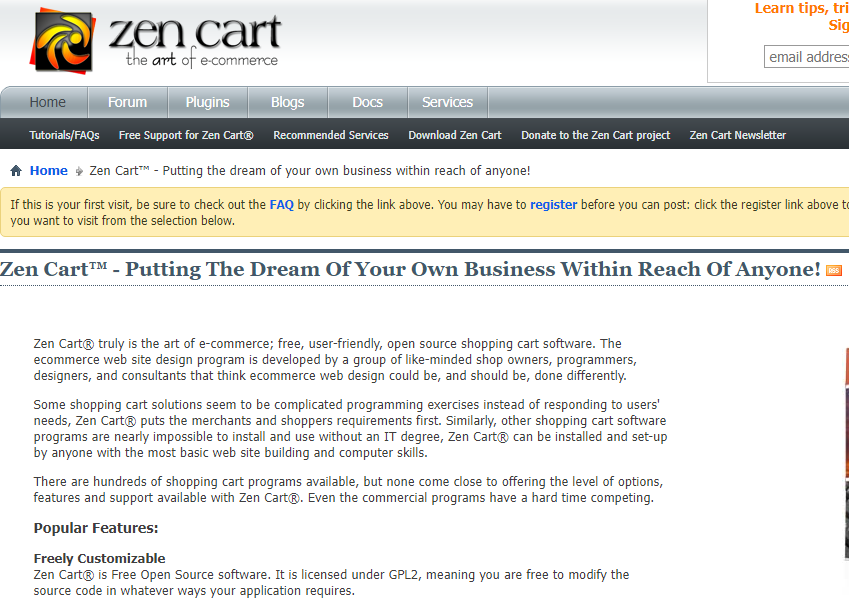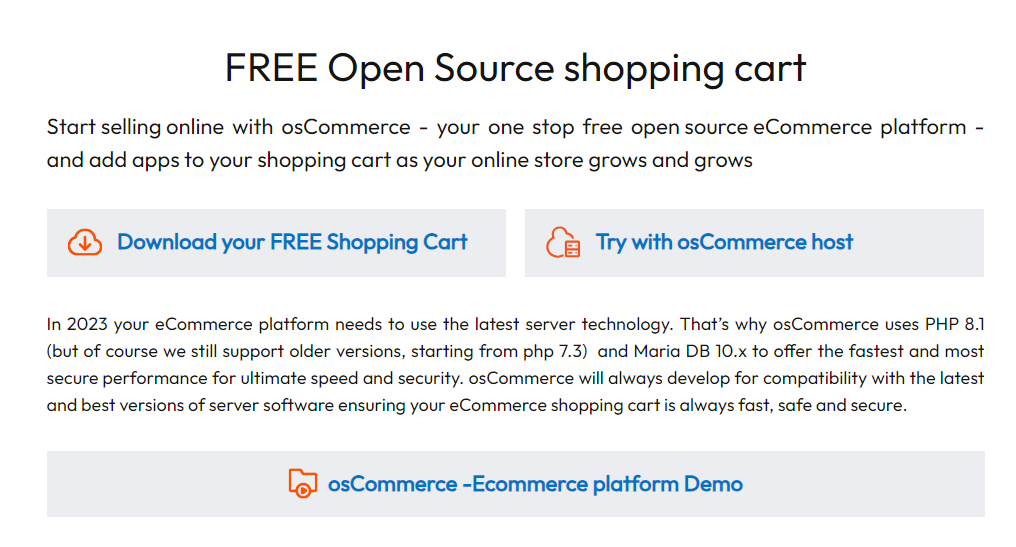Are There Any Free Alternatives To Shopify?
When it comes to eCommerce, Shopify is one of the major players in town, and rightly so, but there are alternatives and potentially free alternatives.
So, are there any free alternatives to Shopify? Technically, yes. However, free to the point that you can install a plugin, or leverage an open-source platform, and install it on a server.
With that in mind, whilst the core is free, you’ll still have to pay for hosting, custom development, an SSL cert, and anything in-between.
Although, we must say, stop thinking what you can get for free! but rather, think what suits your business model, and what features each platform offers.
As previously said, while the core is a free alternative to Shopify, but you still have to consider additional costs. Below we'll discuss the free alternatives.
Related blog posts:
- Shopify pricing plans - A Guide to Shopify Fees
- What is Shopify?
- What is MyShopify?
- Shopify v WordPress
- Shopify sign in - a guide to logging in.
WooCommerce
WooCommerce is one of the most popular eCommerce platforms available. It’s a free plugin that you can use with WordPress to create an online store. It’s easy to set up and use, and it offers a range of features and tools to help you manage your store. It’s also highly customizable, so you can create a unique store that fits your needs.
It's worth pointing out, that WooCommerce is deemed "free" because it's a free plugin BUT you still need hosting for WordPress, and various other services and tools.
Price: Anywhere from $10 per month, to $100 per month (Includes domain, and hosting). A full break down of WooCommerce costing can be found on CloudWays: WooCommerce Pricing
WooCommerce Features:
- Store Setup: WooCommerce provides an intuitive setup wizard that guides you through the process of configuring your online store. You can customize the appearance, set up payment and shipping options, define tax rules, and manage other essential store settings.
- Product Management: You can easily add and manage products in WooCommerce. It supports various product types such as physical goods, digital downloads, and even subscription-based products. You can set prices, inventory levels, product variations, and attributes.
- Payment Options: WooCommerce supports a variety of payment gateways, including popular providers like PayPal, Stripe, and Authorize.Net. It also allows offline payments such as cash on delivery or bank transfers. You can enable multiple payment methods to offer flexibility to your customers.
- Shipping Options: You can define shipping zones and methods in WooCommerce. It supports various shipping providers and gives you control over shipping rates, restrictions, and order tracking. You can offer free shipping, flat-rate shipping, or calculate rates based on weight or location.
- Inventory Management: WooCommerce helps you track and manage your inventory. You can set stock levels for products, receive notifications for low stock, and automatically hide products when they are out of stock. It also allows you to manage backorders and display stock availability to customers.
- Marketing and Promotion: WooCommerce provides built-in marketing features to help you promote your products. You can create discount coupons, run sales campaigns, offer product bundles, cross-sell and upsell products, and integrate with email marketing tools for customer engagement.
- Reporting and Analytics: WooCommerce offers various reports to track your store's performance. You can monitor sales, orders, customer behavior, and inventory through its dashboard. It also integrates with Google Analytics for more advanced insights.
- Extensibility and Customization: WooCommerce is highly customizable and extensible. You can choose from a wide range of themes and extensions to enhance the functionality of your store. There are thousands of free and premium plugins available to add features like memberships, bookings, product reviews, and more.
- Mobile-Friendly and Responsive: WooCommerce provides a mobile-friendly interface, ensuring that your store looks and functions well on smartphones and tablets. This is essential as mobile shopping continues to grow in popularity.
- Community and Support: WooCommerce has a large and active user community, which means you can find support, tutorials, and documentation easily. There are forums, documentation, and dedicated WooCommerce experts available to help you with any issues or questions you may have.

WooCommerce
OpenCart
OpenCart is another free eCommerce platform that offers a range of features and tools to help you create an online store. It’s easy to set up and use, and it’s highly customizable. It also offers a range of payment gateways and shipping options, so you can easily accept payments and ship orders.
OpenCart is technically free as a download, BUT you'll still need hosting, and other services to get up and running.
Pricing: $10 to $50 per month. (Includes domain and hosting). A guide on OpenCart can be found at LitExtension: OpenCart review
OpenCart Features:
- Store Management: OpenCart offers a user-friendly administration dashboard that allows you to easily manage your store. You can add and categorize products, set prices and discounts, manage inventory, and handle customer orders.
- Product Management: You can add an unlimited number of products to your OpenCart store. It supports various product types such as physical goods, digital downloads, and recurring subscriptions. You can set attributes, options, and multiple images for each product.
- Payment Options: OpenCart provides integration with multiple payment gateways, including PayPal, Stripe, Authorize.Net, and many more. You can offer different payment methods to your customers, such as credit card payments, bank transfers, or cash on delivery.
- Shipping Methods: You can set up different shipping methods and rates in OpenCart. It supports various shipping providers and allows you to define shipping zones and rules based on weight, location, or other criteria. You can offer free shipping, flat-rate shipping, or real-time shipping rates.
- Extensions and Themes: OpenCart has a large marketplace where you can find numerous extensions and themes to enhance the functionality and appearance of your store. You can add features like customer reviews, social media integration, marketing tools, and more. The themes allow you to customize the design and layout of your store.
- Multi-Store Support: OpenCart allows you to manage multiple stores from a single admin panel. You can create and operate different stores with separate product catalogs, customer databases, and themes, all managed centrally.
- Marketing and Promotions: OpenCart provides built-in marketing features to help you promote your products. You can create discount coupons, run sales campaigns, offer special deals, and provide product recommendations to customers. It also integrates with popular email marketing services for customer engagement.
- Analytics and Reporting: OpenCart offers reporting and analytics tools to track the performance of your store. You can monitor sales, orders, customer behavior, and other metrics to make informed business decisions. You can also integrate Google Analytics for more advanced insights.
- Multi-Language and Multi-Currency Support: OpenCart allows you to create a multilingual store to cater to customers from different regions. It supports multiple currencies, enabling you to sell products in different currencies and offer localized shopping experiences.
- SEO-Friendly: OpenCart is designed with search engine optimization (SEO) in mind. It provides features like customizable URLs, meta tags, and SEO-friendly page structures, helping your store rank higher in search engine results and attract more organic traffic.

OpenCart
Magento
Magento is a powerful open-source eCommerce platform used for building and managing online stores. It provides a highly customizable and feature-rich solution that caters to businesses of all sizes, from small businesses to large enterprises.
To reiterate, Magento is free if you opt for the open source license version, but you'll be hit with hosting, SSL, and custom development. You can find a full break down on MageStore: Magento Pricing
Pricing: Anywhere from $100 to $1500.
Magento Features:
- Flexible and Scalable: Magento is known for its flexibility and scalability, making it suitable for businesses of all sizes. It can handle small online stores as well as large enterprise-level eCommerce websites with high traffic and complex requirements.
- Product Management: Magento provides advanced product management capabilities. You can easily add, edit, and organize products, assign categories and attributes, manage inventory, set pricing and discounts, and handle product variants and configurations.
- Catalog Management: With Magento, you can efficiently manage your product catalogs. It supports multiple product types, including simple, configurable, grouped, and virtual products. You can create custom product attributes, import/export catalog data, set up product relations, and manage product reviews and ratings.
- Payment and Shipping Options: Magento offers a wide range of payment and shipping options. It supports integration with various payment gateways such as PayPal, Stripe, Authorize.Net, and more. You can define multiple shipping methods, rates, and rules based on weight, location, or other criteria.
- Extensive Customization: Magento provides a highly customizable platform. You can customize the appearance and layout of your store using themes and templates. It also offers a robust module system that allows you to extend and modify the functionality of your store through custom modules and integrations.
- Mobile-Friendly and Responsive: Magento offers responsive design themes, ensuring that your online store looks and functions well on different devices, including smartphones and tablets. This is crucial as mobile shopping continues to grow in popularity.
- Marketing and Promotion: Magento provides a suite of marketing and promotional tools. You can create and manage discount coupons, run promotional campaigns, offer up-sells and cross-sells, implement customer segmentation, and integrate with email marketing services. It also supports content management features for creating landing pages and promotional content.
- Analytics and Reporting: Magento offers comprehensive reporting and analytics capabilities. You can track and analyze sales, customer behavior, website performance, and other key metrics. It also integrates with Google Analytics for more advanced insights.
- Multi-Store Management: Magento allows you to manage multiple stores from a single admin panel. You can create and operate different stores with separate catalogs, pricing, and customer groups, sharing common resources and data.
- SEO-Friendly: Magento is designed with search engine optimization (SEO) best practices in mind. It provides features like customizable URLs, meta tags, sitemaps, and SEO-friendly page structures, enabling you to optimize your store for better search engine visibility.
- Internationalization and Localization: Magento supports multiple languages and currencies, allowing you to create multilingual and multi-currency stores to cater to a global audience. It also handles tax rules and calculations for different regions.
- Security and Performance: Magento offers robust security features to protect your store and customer data. It includes built-in security measures like secure payment gateways, secure browsing, and data encryption. It also provides caching mechanisms and performance optimization tools to enhance the speed and performance of your store.

Magento
PrestaShop
PrestaShop is a popular open-source eCommerce platform that enables individuals and businesses to create and manage online stores. It offers a comprehensive set of features and a user-friendly interface, making it suitable for businesses of all sizes.
While PrestaShop is open-source and free to some degree, you cannot host for free!
Pricing: Anywhere from $10 to $1000.
PrestaShop Features:
- Store Setup and Management: PrestaShop provides a user-friendly interface for setting up and managing your online store. You can easily configure your store settings, customize the design and layout, manage products and categories, handle customer orders, and track inventory.
- Product Management: PrestaShop offers robust product management capabilities. You can create and manage product catalogs, define attributes and combinations, set pricing and discounts, manage stock levels, and handle product variations and options. It also supports digital products and downloadable files.
- Payment and Shipping Options: PrestaShop supports a wide range of payment gateways, including popular providers like PayPal, Stripe, and Authorize.Net. It also offers various shipping methods, allowing you to define shipping carriers, rates, and rules based on weight, location, or other criteria.
- Extensibility and Add-ons: PrestaShop provides a large marketplace of add-ons and modules to extend the functionality of your store. You can find additional features like customer reviews, marketing tools, social media integration, and more. These add-ons allow you to customize and enhance your store according to your specific requirements.
- Themes and Design: PrestaShop offers a selection of responsive themes and templates to customize the design of your store. You can choose from a range of visually appealing themes or create your own design. The themes are mobile-friendly, ensuring a seamless shopping experience across devices.
- Marketing and Promotions: PrestaShop provides built-in marketing tools to promote your products and increase sales. You can create discount coupons, run sales campaigns, offer product bundles, implement cross-selling and upselling strategies, and integrate with email marketing services.
- Analytics and Reporting: PrestaShop offers reporting and analytics features to track your store's performance. You can monitor sales, orders, customer behavior, and other key metrics through its dashboard. It also integrates with Google Analytics for more in-depth insights.
- Multi-Store Management: PrestaShop allows you to manage multiple stores from a single admin panel. You can create and operate different stores with separate catalogs, pricing, and customer groups, while sharing common resources and data.
- Localization and Internationalization: PrestaShop supports multiple languages, currencies, and tax rules, enabling you to create multilingual and multi-currency stores. It handles regional tax calculations, currency conversions, and localized features to cater to a global audience.
- SEO-Friendly: PrestaShop is designed with search engine optimization (SEO) best practices in mind. It provides features like customizable URLs, meta tags, sitemaps, and SEO-friendly page structures, allowing you to optimize your store for better search engine visibility.
- Security and Performance: PrestaShop offers security measures to protect your store and customer data. It includes secure payment gateways, secure browsing, and options for data encryption. It also provides performance optimization features such as caching and database optimization to enhance the speed and performance of your store.

PrestaShop
ZenCart
ZenCart is an open-source eCommerce platform that allows individuals and businesses to create and manage online stores. It is based on the PHP programming language and uses a MySQL database for data storage. Zen Cart provides a comprehensive set of tools and features to facilitate the setup, customization, and management of online stores.
Being open-source, technically means it's free, BUT like with many of the open-source eCommerce platforms, you'll be paying for hosting, and potentially custom development. A full breakdown of ZenCost pricing can be found on shift4shop: ZenCart pricing.
Pricing: Anywhere from $10 to $1000.
ZenCart Features:
- Store Setup and Management: Zen Cart provides an easy-to-use interface for setting up and managing your online store. You can configure store settings, customize the design and layout, manage products and categories, handle customer orders, and track inventory.
- Product Management: Zen Cart allows you to add and manage a large number of products. You can set prices, define product attributes and options, manage stock levels, handle product variations, and offer discounts and special pricing. It supports physical products, digital downloads, and virtual products.
- Payment and Shipping Options: Zen Cart integrates with various payment gateways, enabling you to accept online payments. It supports popular providers like PayPal, Stripe, Authorize.Net, and others. You can also set up different shipping methods and rates based on weight, location, or other criteria.
- Themes and Design: Zen Cart provides a selection of templates and themes to customize the appearance of your store. You can choose from different designs and layouts or create your own design using HTML and CSS. The themes can be modified to match your branding and style.
- Extensibility and Add-ons: Zen Cart offers a range of add-ons and modules to extend the functionality of your store. These add-ons allow you to enhance features such as marketing, customer management, shipping options, payment methods, and more. You can find additional add-ons in the Zen Cart marketplace or develop custom modules.
- Marketing and Promotions: Zen Cart provides marketing tools to promote your products and increase sales. You can create discount coupons, run special promotions, offer quantity discounts, implement cross-selling and upselling strategies, and integrate with email marketing services.
- Analytics and Reporting: Zen Cart offers basic reporting capabilities to track the performance of your store. You can monitor sales, orders, customer behavior, and other key metrics. However, compared to more advanced eCommerce platforms, the reporting capabilities in Zen Cart may be limited.
- Localization and Internationalization: Zen Cart supports multiple languages, currencies, and tax rules, allowing you to create multilingual and multi-currency stores. It handles regional tax calculations, currency conversions, and localized features to cater to a global audience.
- SEO-Friendly: Zen Cart provides features to help optimize your store for better search engine visibility. You can customize URLs, meta tags, and page titles to improve SEO. However, it may require additional SEO efforts and optimizations to compete with more modern eCommerce platforms in terms of SEO capabilities.
- Security and Performance: Zen Cart includes basic security measures to protect your store and customer data. However, as with any eCommerce platform, it's important to keep the software up to date and implement additional security measures as needed. Performance optimization may also require additional efforts to improve the speed and performance of your store.

ZenCart
osCommerce
osCommerce is an open-source eCommerce platform that allows individuals and businesses to create and manage online stores. It was one of the first widely adopted eCommerce platforms and has a long history in the industry. osCommerce is based on PHP and uses a MySQL database for data storage.
Yes, it's free because it's open-source, but many will not have the technical experience to set up a database, install osCommerce on a server, and install an SSL cert, so is it really free for the vast majority?!
Pricing: Anywhere from $10 to $1000.
osCommerce Features:
- Store Setup and Management: osCommerce offers a straightforward installation process and an easy-to-use administration interface for setting up and managing your online store. You can customize the design, manage products and categories, handle customer orders, and configure store settings.
- Product Management: osCommerce allows you to add and manage an unlimited number of products. You can set prices, define product attributes and options, manage inventory, and handle product variations and configurations. It supports both physical products and digital downloads.
- Payment and Shipping Options: osCommerce integrates with various payment gateways, enabling you to accept online payments. It supports popular providers like PayPal, Stripe, and Authorize.Net. You can also set up different shipping methods and rates based on weight, location, or other criteria.
- Extensibility and Add-ons: osCommerce has a vibrant community that has developed a wide range of add-ons and modules to extend the functionality of your store. These add-ons allow you to enhance features such as marketing, customer management, shipping options, and more.
- Themes and Design: osCommerce provides a selection of templates and themes to customize the appearance of your store. You can choose from different designs and layouts or create your own design using HTML and CSS. However, it's worth noting that the default themes may require additional customization for a more modern and visually appealing look.
- Marketing and Promotions: osCommerce offers features to help you promote your products and increase sales. You can create discount coupons, run sales campaigns, implement cross-selling and upselling strategies, and integrate with email marketing services for customer engagement.
- Analytics and Reporting: osCommerce provides basic reporting capabilities to track your store's performance. You can monitor sales, orders, and customer behavior to gain insights into your business. However, compared to more modern eCommerce platforms, the reporting capabilities in osCommerce may be limited.
- Localization and Internationalization: osCommerce supports multiple languages, currencies, and tax rules, allowing you to create multilingual and multi-currency stores. It handles regional tax calculations, currency conversions, and localized features to cater to a global audience.
- SEO-Friendly: osCommerce offers some SEO features, such as customizable URLs and meta tags, to help optimize your store for better search engine visibility. However, it may require additional customization and SEO efforts to compete with more modern eCommerce platforms in terms of SEO capabilities.
- Security and Performance: osCommerce provides basic security features to protect your store and customer data. However, as it is an older platform, it may require additional security measures and updates to ensure the security of your store. Performance optimization may also require additional efforts to improve the speed and performance of your store.

osCommerce
The Takeaway
As you can see, there are a number of free alternatives to Shopify that can help you get your business off the ground without breaking the bank, but you must consider additional costs!
To summarize we've briefly covered:
- Are there any free alternatives to Shopify?
What next:
- A list of the best eCommerce books for beginners
- A list of the best books on dropshipping
- Best books to learn SEO
- Best social media marketing books
- Why social proof is important
- How to get easy backlinks
- What is personalized direct mail?
- Why are image alt tags important
- Share this post, every little helps.
- Subscribe to our newsletter below for tips and tricks to help boost sales.
Additional Shopify Resources
With Shopify being one of the largest eCommerce platforms on the market means you’ll never be short of resources to learn how to build a profitable eCommerce business.
Kanteneo aims to be the best Shopify blog on the market, but you may require additional resources to help you on that journey. Below we’ve listed a top-selling Shopify book by Veronica Jeans to help you learn how to launch a profitable business.


